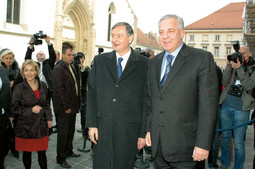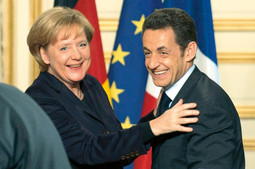03.12.2008. / 19:00
Political report
Brussels demands Sanader appoint better ministers
Although Croatia will open ten negotiating chapters at the 19 December intergovernmental conference, it is increasingly likely that the negotiations will drag on into 2010
 Danilo Turk and Ivo Sanader"Your Prime Minister Ivo Sanader is without a doubt the political leader of modern Croatia, but the way in which he governs has become counterproductive of late. Every time we hit on some problem, and seek an answer from the competent minister, they direct us to the Prime Minister. What is bad here is not only that Croatia is evidently a very centralised country, but also the fact that one person decides on practically everything, and when he is for some reason unavailable, there is a blockade in the national institutions. However much Sanader has the support of most of us conservative politicians in the EU, this practice is beginning to bother us. What is worst, a growing number of European officials are of the opinion that this is one of the key reasons that Croatia is lagging in its negotiations with the European Union," Nacional was told a few days ago by one of the leading members of the European People's Party, the leading political group in European Parliament.
Danilo Turk and Ivo Sanader"Your Prime Minister Ivo Sanader is without a doubt the political leader of modern Croatia, but the way in which he governs has become counterproductive of late. Every time we hit on some problem, and seek an answer from the competent minister, they direct us to the Prime Minister. What is bad here is not only that Croatia is evidently a very centralised country, but also the fact that one person decides on practically everything, and when he is for some reason unavailable, there is a blockade in the national institutions. However much Sanader has the support of most of us conservative politicians in the EU, this practice is beginning to bother us. What is worst, a growing number of European officials are of the opinion that this is one of the key reasons that Croatia is lagging in its negotiations with the European Union," Nacional was told a few days ago by one of the leading members of the European People's Party, the leading political group in European Parliament.
An identical opinion was voiced – very discretely, of course – by an influential official with the European Commission delegation to Zagreb.
The opinions of these two, very well informed, European officials outlines to a great extent the situation in the relations between Croatia and the EU. And although as many as ten negotiation chapters are to be opened at the intergovernmental conference that is to be held on 19 December, the feeling has been voiced even in our foreign ministry that the talks will drag out to 2010. The worst thing is that the prolonging of the negotiations depends equally on domestic ineptitude and unwillingness to make radical cuts, in shipbuilding for example, and the horribly incompetent national administration, and on the few factors that nobody knows what kind of consequences they shall have: the French initiative towards Croatia and Slovenia, the policies of the new government in Ljubljana, and even the repercussions that could be caused by a possible Icelandic bid to join the Union.
The recent visit by Slovenian President Danilo Turk, and the repeated advocacy of the, in Croatia long ago absolutely rejected, Racan-Drnovsek agreement, was not well received at the foreign ministry. And while it boils down only to Turk's manoeuvrings, as Slovenia knows full well that there is no chance of a renewal of the agreement reached by Ivica Racan and Janez Drnovsek, persisting on long-ago failed options is costing Croatia time. And it is "timing" in fact that is the core issue in the relations between Croatia and the European Union if, of course, Sanader's promise of 2009 as the year in which the negotiations are to be completed is to be realised. Judging by the scepticism ruling the domestic diplomacy, it could be said that the announced date is very much under a question mark.
One should not ignore the personnel and organisations problems that Nacional's sources from European institutions have warned of. Even though they did not blame anyone explicitly, they are evidently very reserved in their judgement of some of the current ministers. Above all this refers to Damir Polancec, Deputy Prime Minister responsible for the economy, who has for years now been unable to address the issue of the shipyards. The European Commission long ago demanded that Croatia do away with most Croatian slipways but Polancec does not dare implement the demands from Brussels. The talks are likely to be shifted to 2010 as a result of his foot-dragging even though José Manuel Barroso and Olli Rehn want the entire process to be wrapped up during their mandate in the European Commission. <br />There is only a slightly more favourable opinion in the EU of defence minister Branko Vukelic, tourism minister Damir Bajs, and also have their doubts about Bozidar Kalmeta because of the scandals that have hit his ministry. Nobody is demanding that they step aside, but there is an evident unhappiness with the way in which they are leading their portfolios.
The criticism should be taken seriously as they are not the result of political quarrels but rather of a dissatisfaction with the work of the national administration. It is evident, on the other hand, that there are fewer warnings related to corruption and the problems in the justice department, which is a result of the entry into the cabinet of Tomislav Karamarko and Ivan Simonovic.
Likewise, of late, there have been several events that work in favour of Croatian ambitions to relatively quickly conclude the majority of the negotiation chapters. Above all, the feeling is in the Croatian diplomacy, there is the initiative of French President Nicolas Sarkozy, aimed at putting pressure on the Slovenes to stop blocking the EU-Croatian negotiations. Sarkozy's proposal asks of Croatia that it give written guarantees whereby it will on no way prejudice the international border between the two countries, and in return Ljubljana will abandon the blockade of five negotiating chapters. The Slovenian political brass has not taken well to the French initiative, but will find it hard to oppose it. This was evident in the exceedingly conciliatory Saturday interview given by the new head of the diplomacy, Samuel Zbogar, to the Novi list daily. Zbogar several times emphasised that Slovenia does not intend to block Croatia, but at the same time, was diplomatic in expressing quite a bit of scepticism regarding the initiative that has come out of France.
 Angela Merkel and Nicolas SarkozyIt looks like another formal obstacle hampering Croatia could also disappear. According to the Irish Times most of the deputies in Dublin's parliament are now in favour of holding a new referendum on the Lisbon Agreement. The latest public opinion polls indicate that most Irish would now support the Treaty they rejected in June of this year. This turn of events is good for Croatia, since Germany and France are of the opinion that there is no possibility of enlargement of the Union without the Lisbon Agreement. Last week's decision by the Supreme Court in the Czech Republic, which ruled that the Lisbon Agreement is not in conflict with the country's constitution, can also be considered a positive development. And while Czech President Vaclav Klaus, the EU's leading euro-sceptic, has appealed to parliamentary deputies not to ratify the document, the issue will, by all accounts, also be positively resolved in the Czech Republic. If one takes into consideration that the Irish and the Czech were to chief opponents of the Lisbon Agreement, the shift in the political climate in these two countries definitely works in Croatia's favour.
Angela Merkel and Nicolas SarkozyIt looks like another formal obstacle hampering Croatia could also disappear. According to the Irish Times most of the deputies in Dublin's parliament are now in favour of holding a new referendum on the Lisbon Agreement. The latest public opinion polls indicate that most Irish would now support the Treaty they rejected in June of this year. This turn of events is good for Croatia, since Germany and France are of the opinion that there is no possibility of enlargement of the Union without the Lisbon Agreement. Last week's decision by the Supreme Court in the Czech Republic, which ruled that the Lisbon Agreement is not in conflict with the country's constitution, can also be considered a positive development. And while Czech President Vaclav Klaus, the EU's leading euro-sceptic, has appealed to parliamentary deputies not to ratify the document, the issue will, by all accounts, also be positively resolved in the Czech Republic. If one takes into consideration that the Irish and the Czech were to chief opponents of the Lisbon Agreement, the shift in the political climate in these two countries definitely works in Croatia's favour.
Over the past few days there has been information coming out of Brussels according to which Iceland is expected to announce its candidacy for membership in the European Union. Until recently most Icelanders were not inclined to this, but the situation has changed fundamentally in the wake of the international financial crisis. Until recently a successful economy, Iceland is now in dire straits, and accession to the EU has emerged as a way out. A well-informed official at the foreign ministry in Zagreb on Monday said that there was a highly likely scenario emerging of a Croatia-Iceland "negotiation package". He feels that this development would suit Croatia as it would in a way guarantee a joint accession, and Iceland de facto already meets all the criteria set out by the Union, with the exception of the issue of fisheries. In other words, Croatia could in some way ride on Iceland's coattails, and could perhaps receive somewhat softer accession criteria.
A new development is the speculation that no one would be surprised if Norway were to soon consider its candidature. Norway is one of the richest countries in the world, but the financial crisis and the drop in oil prices, on which its economic expansion is based, could result in the kinds of reactions now emerging in Iceland. Zagreb's diplomats say that they got the news out of Brussels recently, and that the scenario suits Croatia.
Related articles
Sanader’s eight fear SDP — Won’t bring down Government
Despite forecasts that he would, former Croatian Prime Minister Ivo Sanader, who recently took his seat in Parliament, will not work from the house… Više
Latest news
-
28.10.2010. / 14:15
'A profitable INA is in everyone's interest'
-
28.10.2010. / 09:38
Sanader’s eight fear SDP — Won’t bring down Government
-
21.10.2010. / 15:02
Interior Ministry turned a blind eye on Pukanic assassination
-
20.10.2010. / 09:34
Barisic could bankrupt HDZ




